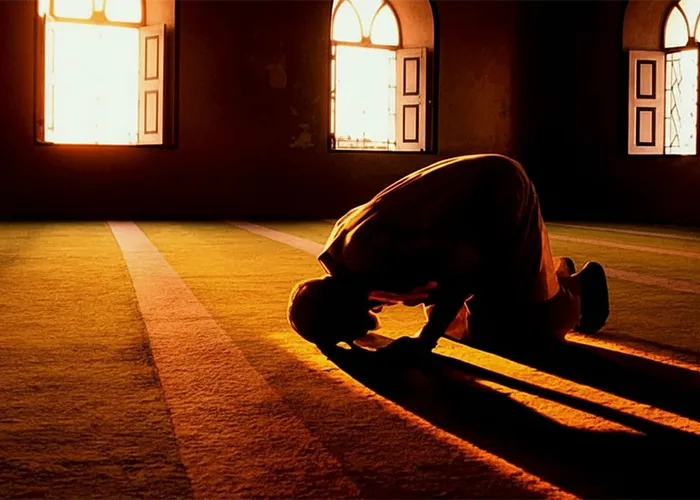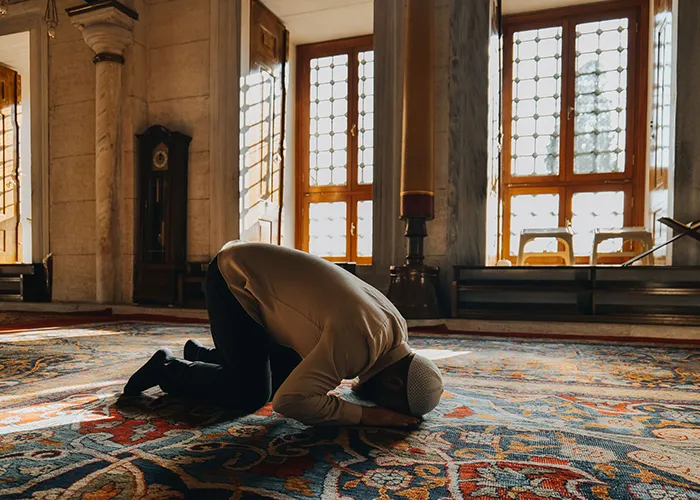Fatwa Panel of the Week – Volume02 Issue47
Obligatory Acts of Prayer
According to the fatwas of the Grand Religious Authorities: Ayatollah Sayyed Ali Khamenei, Ayatollah Sistani, and Ayatollah Makarem Shirazi (may Allah prolong their blessings):
Fatāwā presented without citing a differing opinion or a specific reference are the common rulings shared by the three respected Marāji‘. In cases where the ruling of one Marjaʿ differs from that of the other two, it is indicated in a footnote under the same number, mentioning the Marjaʿ by name.
Objects on which (sajdah) prostration is valid
1. Plants that are edible in some regions or by some people, even if others do not eat them, are considered edible, and prostration (sajdah) on them is not valid.
2. Prostrating (sajdah) on a piece of paper made of wood or plants other than flax and cotton is valid.
Ayatollah Sistani: If the paper used for writing is made from something upon which prostration is valid — such as wood or straw — then it is permissible to prostrate on it. The same ruling applies if it is made from cotton or linen. However, if it is made from silk or similar materials, prostration on it is not valid. As for tissues (paper napkins), one may prostrate on them only if it is known that they are made from a material upon which prostration is valid.
Ayatollah Makarem Shirazi: It is permissible to prostrate on paper unless one is certain that it is made from cotton or other materials upon which prostration is legally invalid. Since most paper today is made from wood — or at least there is doubt as to what it is made from — prostration on it is permissible.
3. If one does not have anything on which prostration (sajdah) is permissible, or if one has such a thing but cannot perform prostration (sajdah) on it due to severe heat or cold, one should prostrate (sajdah) on one’s clothes or something else made of flax or cotton. By way of obligatory precaution, if it is possible to prostrate on clothes made of cotton or flax, a person should not prostrate on clothes which are not made of cotton or flax. If, however, one does not have such clothing, one may perform prostration (sajdah) on the back of one’s hand, by way of obligatory precaution.
Ayatollah Sistani: If one does not have anything upon which prostration is valid, or if such an item exists but due to extreme cold, heat, or similar reasons one cannot prostrate on it, then prostration on pitch or tar takes precedence over prostration on other things. If even that is not possible, one should prostrate on one’s clothing or on anything else upon which prostration is normally invalid. However, it is recommended as a precaution that as long as it is possible to prostrate on one’s clothing, one should not prostrate on anything else.
Ayatollah Makarem Shirazi: If one does not have anything upon which prostration is valid, or due to excessive heat or cold cannot prostrate on it, then one should prostrate on one’s clothing if it is made of linen or cotton. If the clothing is made of another material (for example, wool), one may prostrate on that or on a carpet. If that too is not possible, then one should prostrate on metals or other mineral substances. And if nothing at all can be found upon which to prostrate, one should prostrate on the back of one’s hand. Thus, the back of the hand is the last option upon which prostration may be performed.
4. If while offering prayer one loses the object on one is performing prostration (sajdah) and has nothing else on which prostration (sajdah) is valid, one should break the prayer if there is enough time. However, if the time for prayer is too short, one should act according to the previous rule.
Ayatollah Sistani: If, during the prayer, the item on which one performs prostration is lost, and one does not have anything else upon which prostration is valid, and it is not possible to retrieve it without invalidating the prayer, then one may act according to the procedure mentioned in the previous ruling (no. 3), whether the time for prayer is limited or sufficient to break the prayer and perform it again.
Ayatollah Makarem Shirazi: If, in the middle of the prayer, the item upon which prostration is valid is lost — for example, if a child takes it away — then, if there is still time left for prayer, one should complete the prayer and, as a precaution, perform it again. If the time is too short, no make-up (qaḍāʾ) is required. In both cases, one should act according to the order mentioned in the previous two rulings.
5. When one has to observe dissimulation (taqiyyah), one can perform prostration (sajdah) on a carpet or other similar object, and it is not necessary for one to go somewhere else to perform the prayer. In case, however, one can perform prostration (sajdah) in the same place on a straw mat, stone, or the like without any difficulty, one should do so by way of obligatory precaution.
Recommended acts of Sajdah
1. The best object to use for prostration (sajdah) is soil from the earth, because using it is a sign of humility before Almighty Allah, and no other soil approaches the great merits of the blessed soil taken from the grave of Imam al-Husayn (peace be upon him).
2. It is recommended (mustaḥab) to perform certain deeds in prostration (sajdah):
- It is recommended (mustaḥab) to glorify Allah by saying “Allaho akbar” (takbīr) before performing the prostration (sajdah) while the body is still.
- When the body is still after the first prostration (sajdah), it is mustahab to say “astaghfirullāha rabbī wa atūbu ilayh”.
- To prolong one’s prostration (sajdah), one can recite remembrance of Allah (dhikr), supplicate for one’s requests in this world and the hereafter, and supplicate for blessings upon the Prophet and his family (ṣalawāt).
- One may repeat the remembrance of Allah (dhikr) of prostration (sajdah) so that it is said an odd number of times.
- After performing prostration (sajdah), it is recommended (mustaḥab) to sit on one’s left thigh, placing the instep of the right foot on the sole of the left foot.
- It is recommended (mustaḥab) to say the following remembrance of Allah (dhikr) while standing up for the next unit (rak’ah): “biḥawlillāhi wa qu-u wwatihi aqūmu wa aq‘ūd” (by the power of God I get up and sit).
Undesirable (Makruh) & Prohibited (Haram) acts of Sajdah
1. It is undesirable [repugnant or repulsive] (makrūh) to recite the Quran while performing prostration (sajdah).
2. It is prohibited (haram) to perform prostration (sajdah) for anyone other than Almighty Allah. If one places one’s forehead on the earth before the last entrance to the shrine, i.e., under the dome of the shrines of the Infallible Imams (pbut), with the intention of prostrating to thank Almighty Allah, there is no problem with it; otherwise, it is forbidden.
Ayatollah Sistani: Prostrating to anyone other than Almighty God is forbidden. As for some people who places one’s foreheads on the ground before the graves of the Imams (peace be upon them), if one does it as an expression of gratitude to Almighty God, there is no problem; otherwise, it is problematic.
Ayatollah Makarem Shirazi: Prostrating to anyone other than Almighty God is forbidden. As for some ordinary people who place one’s forehead on the ground before the graves of the Imams (peace be upon them), if it is done with the intention of prostrating to the Imam (peace be upon him), it is a forbidden act. But if it is done to thank God, there is no problem. However, if it appears to onlookers as though one is prostrating to the Imam (peace be upon him), or it gives enemies an excuse for accusation, then it is objectionable.
Obligatory prostration (sajdah) while reciting the Quran
1. In each of the four chapters of the Holy Quran, al-Sajdah, Fuṣṣilat, al-Najm, and al-‘Alaq, there is a verse of obligatory (sajdah) prostration. When one recites or listens to the whole verse, one is obligated to immediately perform prostration (sajdah). If one forgets to perform prostration (sajdah), one should do so whenever one remembers.
Ayatollah Sistani: If one hears the verse of prostration without intention or choice, performing the prostration is not obligatory, although it is better to do so.
Ayatollah Makarem Shirazi: If one does not intentionally listen, but the verse of prostration merely reaches their ears, then according to obligatory precaution, they must perform the prostration.
2. Only reciting, or listening to, the whole verse makes prostration (sajdah) obligatory, i.e., reciting or listening to just a fragment of such verse does not obligate one to perform prostration (sajdah).
3. Reciting or listening to the translation of a verse of prostration (sajdah) does not obligate one to perform prostration (sajdah).
4. If one listens to a verse of prostration (sajdah) broadcast from a tape recorder, radio, television, or the like, one should perform prostration (sajdah).
Ayatollah Sistani: However, if one hears the verse of prostration from a tape recorder, CD, DVD, or similar devices, prostration is not obligatory — and the same applies to the radio if it is not a live broadcast. But if the radio is broadcasting the verse of prostration live, then prostration becomes obligatory.
Ayatollah Makarem Shirazi: If one hears the verse of prostration from something like a tape or radio, it is precautionarily recommended to perform the prostration.
5. To perform the obligatory prostration (sajdah) for a verse of the Quran, one should prostrate on an item on which prostration (sajdah) in prayer is permissible. Yet, it is not obligatory to observe other conditions that are required for prostration (sajdah) in prayer, such as facing the direction of prayer (qiblah) or having performed ritual ablution (wudu).
Ayatollah Sistani: As an obligatory precaution, in the obligatory prostration of the Qur’an, one should place the forehead on a turbah (clay tablet) or any other material upon which prostration is valid. And as a recommended precaution, one should also place the other parts of the body on the ground in the manner described for prostration in prayer.
Ayatollah Makarem Shirazi: In the obligatory prostration of the Qur’an, one must place the forehead on something upon which prostration in prayer is valid, according to obligatory precaution. One must also observe covering the private parts and ensure that the place of prostration is not usurped (ghasbi). However, the other conditions required in the prayer are not necessary for this obligatory prostration.
6. To perform an obligatory prostration (sajdah) for a verse of the Quran, placing the forehead on the ground is sufficient, and it is not necessary to utter any remembrance of Allah (dhikr), although it is recommended (mustaḥab) to recite a remembrance of Allah (dhikr), preferably the following:
لا إله إلا الله حقا ، لا إله إلا الله إيمانا وتصديقا ، لا إله إلا الله عبودية ورقاً ، سجدت لك يا رب تعبدا ورقا لا مستنكفا ولا مستكبرا بل أنا عبد ذليل ضعيف خائف مستجير
(There is no god but Allah, truly, truly. There is no god but Allah, I believe in this certainly and I affirm it certainly. There is no god but Allah, I testify this in servitude and as a humble servant. I prostrate to You, O my Lord, in servitude and as a humble servant, not disdainfully nor arrogantly. Rather, I am a humble servant, weak, fearing, and seeking refuge.)
news via inbox
Subscribe to the newsletter.




